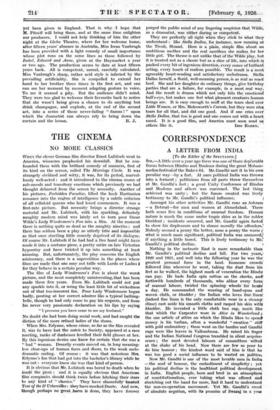THE CINEMA
NO MORE CLASSICS
WHEN the clever German film director Ernst Lubitsch went to America, wiseacres prophesied his downfall. But he con- founded them with the brilliant comedy of manners, first of its kind on the screen, called The Marriage Circle. It was strangely civilized and witty, it was, for its period, marvel- lously well-acted : and it introduced to the cinema scores of sub-moods and transitory emotions which previously we had thought debarred from the screen by necessity. Another of his pictures, Forbidden Paradise, lifted the back Ruritanian romance into the reWrns of intelligence by a subtle criticism of all celluloid queens who had loved commoners. It was a first-rate picture. But necessity brings a director strange material and Mr. Lubitsch, with his sparkling, delicately naughty modern mind was lately set to turn poor Oscar Wilde's Lady Windermere's Fan into a film. At the moment there is nothing quite so dead as the naughty nineties : and there has seldom been a play so utterly trite _and impossible as that once startling little comedy deprived of its dialogue. Ofeourse Mr. Lubitsch if he had had a free hand might have made it into a costume piece, a pretty satire on late Victorian hypocrisy and have twisted it up into something at least amusing. But, unfortunately, the play concerns the English aristocracy, and there is a superstition in the places where films are made that one may not trifle with Lords or Ladies ; for they behave in a certain peculiar way.
The film of Lady Windermere's. Fan is . about the worst picture, and the most completely uninteresting, that has been made these five years. Even Mr. Lubitsch could not put any sparkle into it, or wring the least little bit of wickedness out of that too-innocent fan. Poor Lady Windermere began badly, pouting at her correct admirer like a typical bathing- belle, though he had only come to pay his respects, and froze his never very passionate declaration on his lips by saying " I presume you have come to see my husband."
No doubt she had been doing social work, and had caught the diction of the More refined ladies of the slums.
When Mrs. Erlynne, whose crime, so far as the film revealed it was to have lost the entree to Society, appeared at a race meeting, ranks of duchesses levelled their field glasses at her. By this ingenious device one knew for certain that she was a " bad " woman. Drearily events Moved on, in long meaning- less close-ups of human faces and &ors, to the weak melo- dramatic ending. Of course : it was that notorious Mrs-. Erlynne's fan that had got' into the bachelor's library while he was out': everVone kmew she Was that kind of Person.
It is obVious that Mr. Lubitsch was bored to' death when he Made the, piece : and it is equally obvious that American film' Companies should think twice before hitching their stars to any kind of classics." They have shamefulS beaded Tess. Of the D'Urberoilles : they have mocked Dante. And now, though perhaps no great harm is done, they have forever
purged the public mind of any lingering suspicion that Wilde; as a dramatist, was either daring Or competent.
They are perfectly all right when they stick to what they understand : like Stella Dallas, for instance, now running at the Tivoli, Strand. Here is a plain, simple film about an ambitious mother and the real sacrifices she Dishes for her little girl: The theme is not unlike that 'of the Wilde play, but it is treated not as a classic but as a slice of life, into which-i7 packed every bit of ingenious direction, every ounce of brilliant sating; every touch of realism possible. The result is a most agreeably heart-rending and satisfactUry melodrama. ,Stella, lianas herself, a florid, well-meaning person, is as real as roast beef. She and her daughter do ordinary things;give birthday parties that are a failure, for example, in a most real way. And the result is drama which 'not only hits the: emotional bull's-eye, hut makes one feel what pleasant Creatures human. beings are. It is easy enough to scoff at the tears shed over Little WoMen, or Mrs. Molesworth's Carrots, but they were nice tears for all that, and did one good. And if one cries over Stella Dallas, that too is good and one comes out with a heart, eased. It is a good film, and America must soon send us


























































 Previous page
Previous page